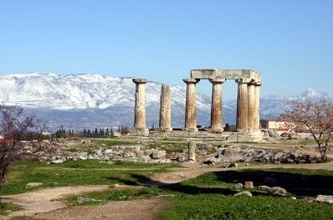 Even if the results of Paul’s preaching on the Areopagus were negligible (Acts 17:32-34, but who is to pronounce on results?), Paul moves on to Corinth. Here are the words of Acts 18:
Even if the results of Paul’s preaching on the Areopagus were negligible (Acts 17:32-34, but who is to pronounce on results?), Paul moves on to Corinth. Here are the words of Acts 18:
18:1 After this Paul departed from Athens and went to Corinth. 18:2 There he found a Jew named Aquila, a native of Pontus, who had recently come from Italy with his wife Priscilla, because Claudius had ordered all the Jews to depart from Rome. Paul approached them, 18:3 and because he worked at the same trade, he stayed with them and worked with them (for they were tentmakers by trade). 18:4 He addressed both Jews and Greeks in the synagogue every Sabbath, attempting to persuade them.
18:5 Now when Silas and Timothy arrived from Macedonia, Paul became wholly absorbed with proclaiming the word, testifying to the Jews that Jesus was the Christ. 18:6 When they opposed him and reviled him, he protested by shaking out his clothes and said to them, “Your blood be on your own heads! I am guiltless! From now on I will go to the Gentiles!” 18:7Then Paul left the synagogue and went to the house of a person named Titius Justus, a Gentile who worshiped God, whose house was next door to the synagogue. 18:8 Crispus, the president of the synagogue, believed in the Lord together with his entire household, and many of the Corinthians who heard about it believed and were baptized. 18:9 The Lord said to Paul by a vision in the night, “Do not be afraid, but speak and do not be silent, 18:10 because I am with you, and no one will assault you to harm you, because I have many people in this city.” 18:11So he stayed there a year and six months, teaching the word of God among them.
When it comes to missional themes, I observe these:

